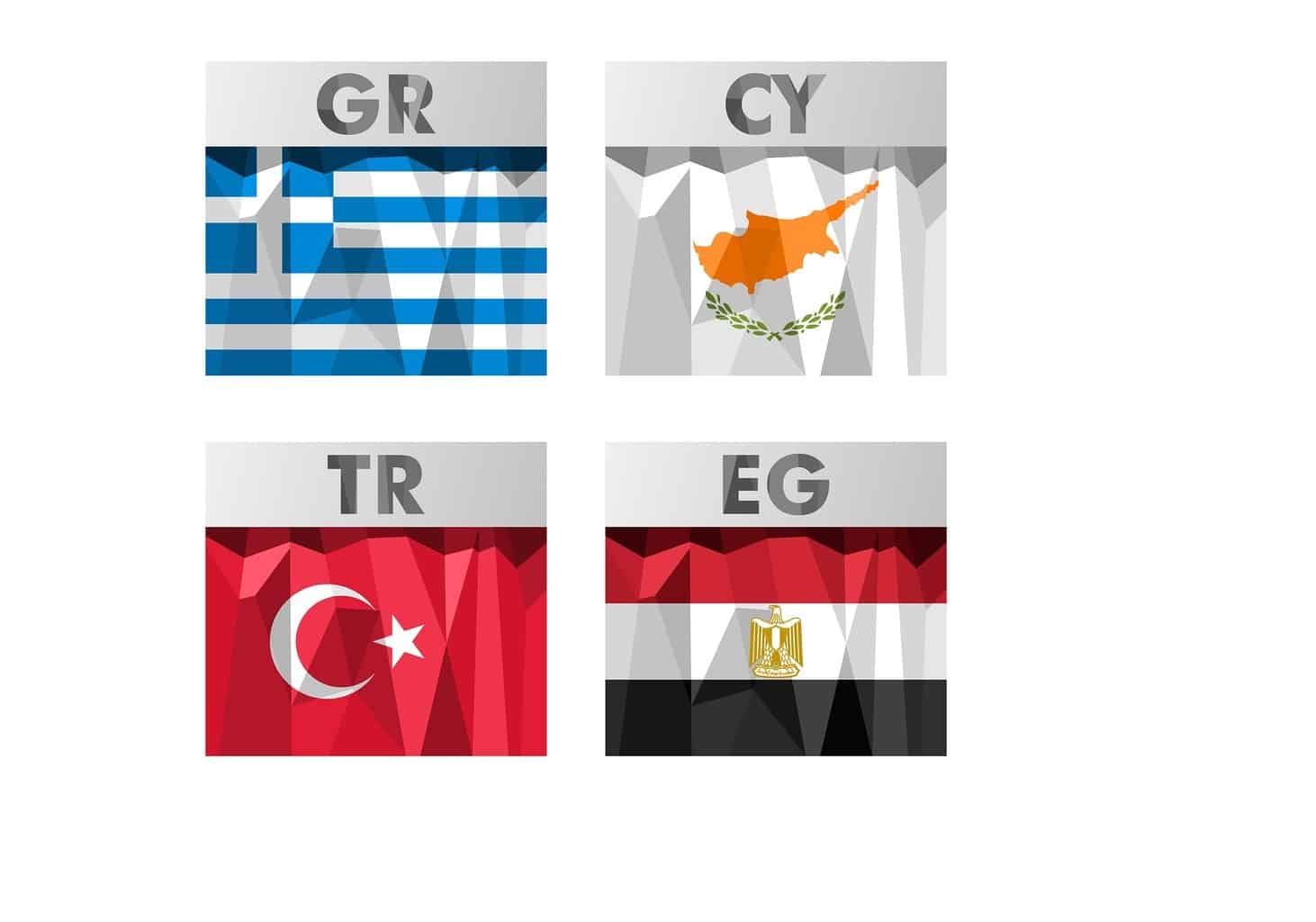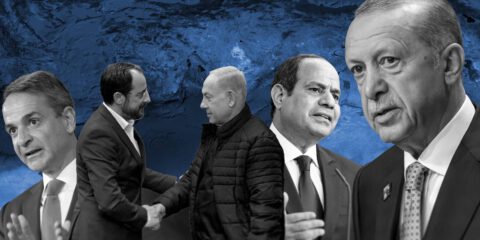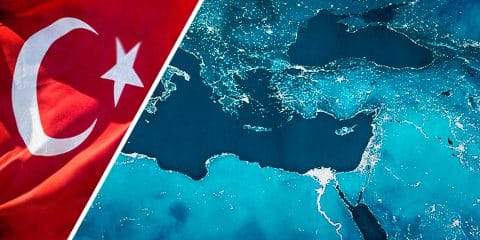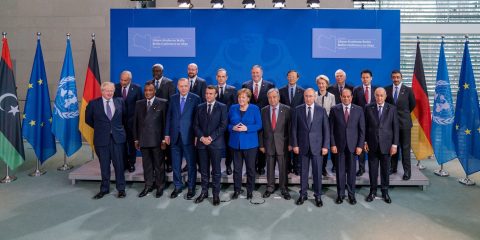מפגש הפסגה היווני-קפריסאי-מצרי שהתקיים בחודש שעבר בכרתים, התמקד באנרגיה ובאיומים מצד תורכיה, אך גם שילם מס שפתיים למסרים המצריים הבעייתיים מבחינת ישראל.
תקציר: מנהיגי יוון, קפריסין ומצרים קיימו ב-10 באוקטובר בכרתים את מפגש הפסגה המשולש השישי (!) שלהם בשנים האחרונות. הפסגה התמקדה בבירור בנושאים ששלוש המדינות רואות כסוגיות הבוערות ביותר שלהן, ומעל לכל בחשיבותה של קישוריות האנרגיה באזור ובסכנה הנשקפת לאזור הכלכלי הבלעדי (‘המים הכלכליים’) של קפריסין מצד תורכיה. לראשונה הוקמה שם גם מזכירות משותפת. במפגש הפסגה הבא עם שותפותיה היווניות שיערך בבאר שבע, צפויה ישראל לנקוט צעדים דומים להשתלבות רחבה יותר בזירת מזרח הים התיכון. למרבה הצער, ההצהרה המשותפת שיצאה מכרתים שילמה בכל זאת מס שפתיים גם לשלל עמדות מצריות מוכרות, כולל קריאה למדינה פלסטינית “בת-קיימא ורציפה” שירושלים המזרחית בירתה על בסיס קווי 67. ההתעקשות המתמדת בנושאים אלה והעמדות הבעייתיות מאוד שעדיין צפות על פני השטח במרחב הציבורי המצרי, הן סוגיה שישראל צריכה להעלות בדיסקרטיות אך בנחישות מול א-סיסי, במיוחד נוכח מאמציה המתמשכים של ישראל להפיג את העוינות שמפגין הקונגרס האמריקאי, שוב ושוב, כלפי מצרים.
****
הפסגה המשולשת שנערכה ב-10 באוקטובר 2018 שבכרתים, כינסה תחת קורת גג אחת את מנהיגי יוון, קפריסין ומצרים בפעם השישית מאז שנת 2014. המפגשים הקודמים נערכו בקהיר (נובמבר 2014 ואוקטובר 2016), ניקוסיה (אפריל 2015 ונובמבר 2017) ואתונה (דצמבר 2015). מסגרת זו, פרי יוזמה משותפת של ראש ממשלת יוון, אלכסיס ציפרס והנשיא הקפריסאי ניקוס אנסטסיאדס, מגשרת על פני חילוקי דעות פוליטיים – ציפרס מזוהה עם השמאל הקשה ואנסטסיאדס בימין-מרכז – וכן על פני היסטוריה ארוכה של מתחים בין היוונים (כאומה נוצרית) למצרים המוסלמית.
יוזמה זו באה בתגובה למה שגם יוון וגם קפריסין ראו כתגובה אירופית בלתי מוצדקת להתערבות הצבא המצרי נגד מורסי בקיץ 2013. בניגוד לבריסל ולמספר חברות מפתח אחרות באיחוד,שראו באירועי אותו קיץ הפיכה צבאית בלתי לגיטימית, שתי המדינות היווניות – הנמצאות בסכסוך היסטורי עם תורכיה וכעת מודאגות מסדר היום האסלאמי של ארדואן – ראו במהלכיו של סיסי בראש ובראשונה נטרול של האיום הפעיל הטמוןבעליית כוחם של האחים המוסלמים במצרים, שהיא בעניהם אבן הפינה ליציבות אזורית.
ישראל גם היא רואה זאת כך. ואכן, סדרה מקבילה של מפגשים משולשים התקיימה בין שני המנהיגים לראש הממשלה נתניהו (ארבעה מפגשים עד כה, כאשר החמישי צפוי להתקיים בבאר שבע). ניתן לראות בדפוס זה – שנוסף לו לאחרונה מפגש משולש גם עם המלך הירדני עבדאללה – הנחת אבני הבניין לארכיטקטורה מדינית-ביטחונית אזורית חדשה.
נוסח ההצהרות המשותפות שיצאו מכל אחד ממפגשים אלה מגדיר את תכליתן כ-“קידום השלום, היציבות, הביטחון והשגשוג במזרח הים התיכון”. הם עוסקים בעיקר ברשימות ארוכות (ובמקרה של ישראל, ארוכות מאוד) של פעולות מעשיות בהן צריכים לנקוט הדרגים הממשלתיים בשלוש המדינות במגוון רחב של נושאים, מחדשנות טכנולוגית ועד שימור אתרי מורשת ארכיאולוגיים תת-ימיים.
כאשר מדובר במפגשי הפסגה שישראל לוקחת בהם חלק, רשימות אלה נוטות להיות ספציפיות למדי ולשקף את שיתופי הפעולה הנרחבים שאכן מתקיימים באופן שוטף, באמצעות עבודתן של מספר ועדות תלת צדדיות. בנוסח שפורסם בכרתים במפגש עם מצרים השפה הייתה כללית יותר. חלק ניכר מההצהרה הוקדש לנקודות משבר אזוריות – הפלסטינים (כמפורט להלן), סוריה, לוב וההגירה הבלתי חוקית.
אולם ההצהרה כללה גם התייחסות לרשת שיתוף החדשנות של קפריסין-מצרים-יוון (CEG COIN) שנוסדה במפגש הפסגה הקודם והיא פועלת כיום מהעיר המצרית בורג’ אל-ערב שלחופי הים התיכון. רשת שיתופי פעולה זו עוסקת בנושאים סביבתיים, לרבות ‘התוכנית התת-אזורית למוכנות ותגובה לאירועי זיהום הים בשמן’; וכן בעידוד תיירות השייט; בחינוך, בחשיבות של עסקים קטנים ועוד. ההצהרה כוללת גם החלטה משמעותית בדבר הקמת מזכירות קבועה בניקוסיה “במטרה לשפר את האפקטיביות של שיתוף הפעולה המשולש”. החלטה דומה תתקבל, והגיע זמנה להתקבל, במפגש הפסגה המשולש הבא של ישראל-יוון-קפריסין.
בכל מקרה, ההיבט המרכזי של הטקסט היה התמיכה הישירה בקפריסין אל מול הלחצים התורכיים בכל הנוגע להפקת אנרגיה במים הכלכליים של קפריסין. ההצהרה המשותפת רמזה שהעמדה התורכית מנוגדת ל’אמנת האומות המאוחדות לחוק הים’, ושמה דגש על הצורך בקישוריות רבה יותר של אנרגיה במזרח התיכון (דבר אותו לא ניתן יהיה ליישם ביעילות כל עוד קפריסין אינה חופשיה לממש את זכויותיה הריבוניות). באופן בלתי מפתיע, הגיבה הממשלה התורכית בכעס על “טענות סרק” אלה. המתח הגובר בסוגיה זו עשוי להעמיד בקרוב את ישראל מול הצורך למצוא את האיזון הנכון בין מחויבותה לשותפיה היווניים, הצורך לדחוף קדימה לשילוב של מקורות אנרגיה, והצורך להימנע ככל האפשר מסבב הסלמה נוסף עם המנהיגות התורכית העוינת, שנקטה לאחרונה צעדים לתיקון קשריה הרעועים עם ממשל טראמפ.
יש לציין שההצהרה המשותפת לא התייחסה בשום צורה מפורשת לישראל כשחקנית ביוזמה של שיתוף פעולה ביטחוני או אנרגטי באזור. מעבר לזה, ולמרות האווירה הידידותית בפגישת א-סיסי-נתניהו בניו יורק, חזר הטקסט על הקלישאות המקובלות שנוהג להשמיע משרד החוץ המצרי בדבר הצורך ב”הסדר שלום צודק, מוסכם וארוך טווח … על-ידי הקמתה של “מדינה פלסטינית ריבונית, בת קיימא ורציפה על בסיס גבולות 1967 שירושלים המזרחית בירתה והיא חיה בשלום עם כל שכנותיה … הפתרון היחיד הנותן מענה משביע רצון לצרכים הביטחוניים של ישראל ושל הפלסטינים ולשאיפות הפלסטיניות”.
אין כאן שום דבר חדש או יוצא דופן, וישראל כבר רגילה להתבטאויות מסוג זה. ייתכן גם שההתייחסויות להסדר מוסכם ולצרכי הביטחון הישראליים הן דווקא חותמם החיובי של השותפים והחברים ההלניים של מצרים (ושל ישראל) באותה פגישה. אבל יש לקרוא זאת בהקשר של האווירה הציבורית התוקפנית ואפילו הארסית, ובוודאי אנטי-ישראלית, השוררת במצרים. אווירה זו באה לאחרונה לידי ביטוי בהחלטה לבטל את הזמנתו של במאי הקולנוע היהודי צרפתי, קלוד ללוש, לפסטיבל הקולנוע בקהיר בשל תמיכתו בישראל. פריטה זו על “השאיפות הפלסטיניות” היא עניין שהמדיניות הישראלית לא יכולה להתעלם ממנו לחלוטין.
בהינתן מלוא היקף שיתוף הפעולה בין ישראל למצרים בעניינים ביטחוניים, התפקיד שניתן למצרים בחיפוש אחר “הסדר” בעזה, ובתמיכה שישראל וידידותיה מעניקות למצרים באדיקות ובעקביות מול לחצים כבדים בקונגרס האמריקאי (ונראה כי אלה שוב נמצאים בעלייה), ישראל רשאית לפנות בדיסקרטיות להנהגה המצרית ולדבר על הפחתת רמת העוינות הגלויה כלפיה והימנעות מתמיכה אוטומטית בדרישות הפלסטינים.
סדרת הפרסומים “ניירות עמדה” מטעם המכון מתפרסמת הודות לנדיבותה של משפחת גרג רוסהנדלר.
תמונה: Bigstock








 - בניית אתרים
- בניית אתרים